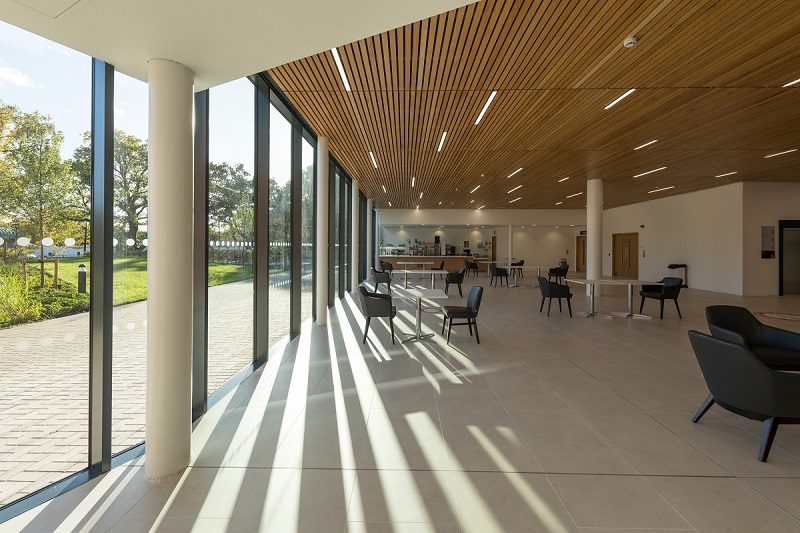The design of a new private hospital is helping to set a benchmark for efficiency across the health sector.
Tech-powered design company, Bryden Wood, recently completed a new hospital for Circle Health Group on the site of the former BBC Pebble Mill Studios in Edgbaston’s Health Quarter.
The project is reinventing hospital design by combining form and function to boost clinical outcomes, delivering enhanced patient care at a 30%-lower cost than comparable hospitals.
Bryden Wood is the architect and engineering contractor for the new 18,000sq m hospital, which comprises five operating theatres, 30 recovery beds, and 140 patient bedrooms.
The cost savings here signal a step change in the way hospitals are designed and constructed
It also houses a comprehensive imaging department and rehabilitation facility.
Bryden Wood and Circle Health Group worked closely to establish a design that separates critical, high-tech, high-spec space from non-critical spaces, such as consulting rooms and waiting areas, to set up the building typologies in line with the appropriate clinical departments.
This significantly reduced costs and allowed the hospital to grow when the decision was made mid-construction to expand vertically to double the size of the initial brief.
Bryden Wood applied its ‘Design to Value’ methodology to the project, analysing multiple processes throughout the building to produce a rationalised design delivering efficiency and value.
As such, clinical, operating, and recovery areas are grouped together on one floor to avoid staff having to move between levels.
Bryden Wood also carried out extensive research into department placement and analysed how patients and staff would use the building in order to optimise the design and improve clinical outcomes and safety.
Paul O’Neill, board director at Bryden Wood, told BBH: “The cost savings here signal a step change in the way hospitals are designed and constructed.
Our focus on value prioritises the aesthetic and human properties of the building, so these savings come from efficiency in design, not a compromise on quality
“Our focus on value prioritises the aesthetic and human properties of the building, so these savings come from efficiency in design, not a compromise on quality.
“We’re proud to say the hospital and its surroundings are beautiful to look at, and a pleasure to be in.”
Healthcare business models are renowned for rapid and disruptive evolution, with the COVID pandemic throwing the spotlight on how inflexible some designs can be.
To respond to this there is an increasing need to create ‘expandable hospitals’ which minimise upfront investment, but allow facilities to grow as business models, and patient needs, evolve.
And flexibility and adaptability in design and construction was key to the Circle project.
Construction started in 2017 with plans for a 10,400sq m scheme.
However, shortly after it began, the business model evolved rapidly and Bryden Wood was appointed to deliver a much-larger, 18,000sq m, facility.
A phased strategy allowed the building to be expanded in different directions, at different times, while maintaining a fully-operational hospital with high-quality functional spaces.
Given the hospital’s location in the Edgbaston Health Quarter, minimising disruption to the character of area and sightlines was a must.
And Bryden Wood designed a hospital that, instead of building higher and higher, was horizontal in focus.
The end result sits comfortably within its green context, with no loss of efficiency for staff and patients.
O’Neill said: “This was a great opportunity to test the flexibility of the design.
Building new facilities that can grow and change over time are high priority for both the NHS and private health organisations
“The adaptability built into our design allowed us to deliver on a significantly-changed brief that was received well into construction.
“Building new facilities that can grow and change over time are high priority for both the NHS and private health organisations and this hospital will be seen as an example of how to successfully future-proof design.”
Jacqueline Droogan, director of capital programme delivery at Circle Health Group, adds: "Bryden Wood's design has enabled us to deliver a high-spec, modern hospital that enables us to introduce the new generation of rehabilitation services into the Midlands, catering for patients with neurological and musculoskeletal conditions and sports injuries."
The project continues Bryden Wood’s long-standing partnership with Circle Health, which began with Circle Reading Hospital and, this year, will see an architect from the practice seconded to Circle Heath to develop its estate of 57 hospitals following Circle’s acquisition of BMI Healthcare.

The floorplan was optimised to reduce staff movement and optimise clinical outcomes and safety
Project Information
- Project starts on site – July 2018
- Project completed – Sept 2020
- Gross External floor area – 18,000sq m
- Construction cost – £40m
- Construction cost per sq m – Under £2300/sqm
- Architect, structural engineer, M&E consultant – Bryden Wood
- QS – TCQ Surveyors
- Planning Consultant – David Lock Associates
- Landscape consultant – Fira
- Acoustic consultant – Hann Tucker
- Project manager – Circle Health
- CDM co-ordinator – Circle Health/Simons Construction
- Main contractor – Simons Construction/Imtech
- Annual CO2 emissions – 60 KgCO2/m2




